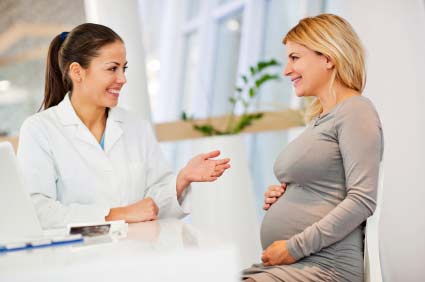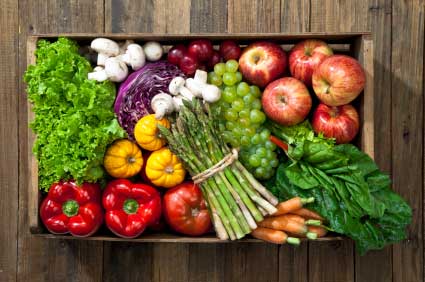A pregnant woman's calorie intake grows during pregnancy. However, this does not mean she should eat for two, i.e. her calorie consumption does not double, it just goes up. Weight gain, if the mother is carrying just one baby, varies considerably. According to the Institute of Medicine, USA, a woman whose body mass index (BMI) is between 18.5 and 24.9 should gain from 25 to 35 pounds (11.4-15.9 kilograms) during the nine months. A woman who is overweight at the start of pregnancy should gain between 15 to 25 pounds (6.8 to 11.4 kg).
Weight gain recommendations may also vary, depending on the woman's age, fetal development, and her current health.
Excessive or insufficient weight gain can undermine the health of both the fetus and the mother. (Up to the eighth week of pregnancy the baby is called an embryo, after that, when its major structures have formed, it is called a fetus)

A woman who is not overweight at the start of her pregnancy, should gain between 25 to 35 pounds by the end of the nine months
What should I eat during pregnancy?
As mentioned above, the mother should follow a varied, balanced, and nutritious diet, and it must include:- Fruit and vegetables - she should aim for five portions of fruit and/or veggies per day. They may be in the form of juice, dried, canned, frozen, or fresh. Fresh and frozen (if frozen soon after picking) produce usually have a higher vitamin and other nutrient content. Experts stress that eating fruit is usually better for you than just drinking the juice.
- Starchy carbohydrate-rich foods - including potatoes, rice, pasta, and bread.
- Protein - good animal-sourced proteins include fish, lean meat and chicken, as well as eggs. Vegan mothers should consider the following foods as good sources of protein: Quinoa (known as a "complete protein", it is said to have all the essential amino acids), tofu and soy products. Beans, lentils, legumes, nuts, seeds and nut butters are also good sources of protein. (Beans, lentils and legumes are also rich in iron)
- Fiber - wholegrain foods, such as whole meal (wholegrain) bread, wild rice, wholegrain pasta, pulses, fruit and vegetables are rich in fiber. Women have a higher risk of developing constipation during pregnancy; eating plenty of fiber is effective in minimizing that risk. Studies have shown that eating plenty of fiber during pregnancy reduces the risk (or severity) of hemorrhoids, which also become more common as the fetus grows. Fiber can also help prevent obesity; something the mother should try to avoid.
- Calcium - it is important to have a healthy daily intake of calcium. Dairy foods, such as milk, cheese, milk and yoghurt are rich in calcium. If the mother is vegan, she should consider the following calcium-rich foods, calcium-fortified soy milk and juices, calcium-set tofu, soybeans, bok choy, broccoli, collards, Chinese cabbage, okra, mustard greens, kale, and soynuts.

Plenty of fruits and vegetables are essential for a healthy pregnancy
Why do I need extra iron?
Iron makes up a major part of hemoglobin. Hemoglobin is the oxygen-carrying pigment and main protein in the red blood cells; it carries oxygen throughout the body. Iron also delivers oxygen to the muscles, so that they can function properly. Also, iron increases our resistance to stress and disease.A woman's body absorbs iron more efficiently when she is pregnant, so she has to consume more of it to make sure that both she and her baby have an adequate oxygen supply. During pregnancy, the amount of blood in the mother's body increases by almost 50% - she needs more iron to make more hemoglobin for all that extra blood, as well as for the growing placenta and the developing baby. Healthy levels of iron will also help prevent depression, weakness, tiredness, and irritability during pregnancy.
Most women start their pregnancy without adequate stores of iron to meet the increasing demands of their bodies, particularly after the third or fourth month. If iron stores are inadequate, the mother may become anemic.
According to the United Nations, approximately 47% of non-pregnant females and 60% of pregnant females have anemia globally. If iron deficient women without anemia are included, the figure is 60% of non-pregnant and 90% for pregnant women. In rich nations, approximately 18% of non-pregnant and 30% of pregnant women are iron-deficient. In industrial nations, figures are higher among those with lower incomes.
If the pregnant mother is iron-deficient, there is a higher risk of:
- Preterm delivery - the baby is born early, a premature baby
- Delivering a low-weight baby
- Stillbirth - the baby dies before it is delivered
- Newborn death - the baby dies soon after it is born
- Tiredness, irritability, depression (in the mother) during the pregnancy
- If the mother is anemic later in the pregnancy, there is a higher risk of losing a lot of blood when she gives birth
- Some experts say there is a higher risk of post-natal depression(postpartum depression). This has to be scientifically proven with further studies.
- The brain of the developing baby could be profoundly affected if the mother has an iron deficiency, experts found in a study; the consequences can have a long-lasting impact. The risk is there even if the anemia is not severe, and occurs early in the pregnancy, researchers from the University of Rochester Medical Center reported in the journal PLoS One. They added that their findings are important, because obstetricians may not detect or treat mild/moderate iron deficiency, especially if it occurs during early pregnancy. (Link to article)
The following foods are rich sources of iron:
- Dried beans
- Dried fruits, such as apricots
- Egg yolk
- Some cereals, if they are fortified with iron
- Liver is rich in iron, but doctors and most nutritionists advise pregnant women to avoid liver. Liver is very high in vitamin A, excess vitamin A may harm the baby during pregnancy.
- Lean meat
- Oysters (make sure they are cooked if you are pregnant)
- Poultry
- Salmon
- Tuna
- Lamb, pork and shellfish also contain iron, but less than the items listed above
- Legumes - lima beans, soybeans, kidney beans, dried beans and peas
- Seeds - Brazil nuts and almonds
- Vegetables, especially dark green ones - broccoli, spinach, dandelion leaves, asparagus, collards, and kale.
- Wholegrains - brown rice, oats, millet, and wheat.
Some teas, such as commercial black tea or pekoe teas have chemicals that bind to iron and make it much harder for the body to absorb the iron.
Page source : medical news today
